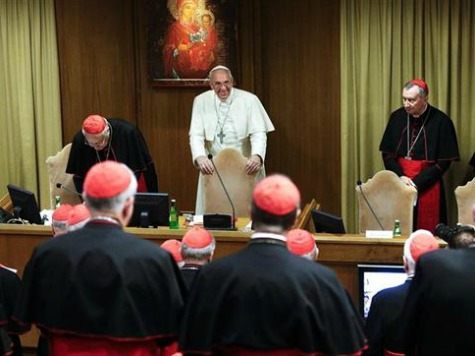The Vatican’s new document that will serve as a guide for discussions in the upcoming synod on marriage and the family has caused consternation among liberals who see the text as a barrier to more progressive reforms in Catholic teaching on marriage.
In its write-up on the working document, or instrumentum laboris, the liberal National Catholic Reporter expressed frustration that the text “does not seem to offer substantially new options for divorced and remarried people seeking the ability to take Communion in the Church” and that it rather “reaffirms the Church’s moral teaching in several areas, including the prohibition on the use of birth control.”
In listing what it calls the “roadblocks” in the text, The Washington Post notes that it “strongly reiterates church teaching on marriage as a sacramental, lifelong commitment between a man and a woman, and it attacks fertility treatment procedures and foresees no change in Catholicism’s views of gay couples.”
From this angle, as well, the Post observes that the text “reconfirms the church’s firm opposition to abortion” and includes the issue of “forced sterilization” in its criticism of violence against women.
A Reuters article said Tuesday’s document indicated “that organizers do not want the issue of how the Church should reach out to homosexual couples to be a key topic,” a statement that seems to reiterate Pope Francis’ words of last December: “Nobody mentioned homosexual marriage at the synod. It did not cross our minds.”
Despite media efforts to bring the issue of homosexuality into the forefront of synod coverage last October, this never was what the synod was about, as made explicit by South African Cardinal Wilfrid Napier. “It’s a sideshow whether we should be talking about same-sex unions as marriages or not marriages. That’s really a sideshow,” he said in an interview.
The Associated Press’s Nicole Winfield, on the other hand, declared that the new Vatican document “confirmed a rollback on welcoming gays into the church,” a disingenuous statement suggesting that gays are not being fully welcomed now, which is verifiably untrue. Opposition to same-sex marriage has nothing to do with full acceptance of all people in the Church, and no one is ever excluded from participating in Church services because of sexual orientation.
Winfield also noted that “Catholic LGBT advocacy groups expressed disappointment over the new working document, saying it hardly reflects the current discussion at lower levels of the Church on welcoming gays and providing them with pastoral care.”
Those who have been pushing for more progressive reforms, notably the German bishops, are finding themselves distinctly in the minority, and the tone of the document, while pastorally sensitive, is theologically orthodox.
Moreover, delegates for this year’s synod seem better prepared for the debates that await them. Last year’s synod seemed to take many by surprise, but that isn’t likely to happen again.
Members of Poland’s delegation, for instance, have pledged to fight any attempts at radical change in Church teaching, and have already stated their opposition to proposals from German bishops to relax Church discipline.
“We certainly won’t be going in the theological direction presented by certain German-speaking circles,” said Archbishop Stanislaw Gadecki Monday. “We believe the output of Paul VI, John Paul II, and Benedict XVI, and recent statements by Pope Francis, are enough to view Church teaching as a continuum, not as a revolution.”
Though the final list of synod attendees has not yet been released, as of now, the Catholic Church in the United States is to be represented at the synod by a conservative dream team, consisting in Louisville, KY, Archbishop Joseph Kurtz, Galveston-Houston Cardinal Daniel DiNardo, Philadelphia Archbishop Charles Chaput, and Los Angeles Archbishop Jose Gomez.
“We need to be more effective in our communication of the meaning of marriage as one man and one woman, on married couples’ call to be open to life, and on the dignity and responsibility of the vocation of marriage,” Archbishop Kurtz told the U.S. Bishops spring general assembly two weeks ago.
Africa will also be better represented this year, and 40 Synod members from Africa have already been ratified, along with at least three others who will be attending because of the office they hold. The generally conservative African bishops proved an unexpected foil for progressives at last year’s synod, leading to a major media gaffe by Cardinal Walter Kasper, who complained that the Africans “should not tell us too much what we have to do.”
Kasper’s unfortunate comments sparked a reaction from Cardinal Napier, who tweeted, “Unlike Pope Francis Cardinal Kasper isn’t very respectful towards the African Church & its Leaders.”
Guinean Cardinal Robert Sarah spoke to bishops gathered in Ghana last week. “Be conscious of the mission of the Church; protect the sacredness of marriage which is now being attacked by all forms of ideologies that intend to destroy the family in Africa,” he said.
“Do not be afraid to stress the teaching of the Church on marriage,” he added.
Follow Thomas D. Williams on Twitter @tdwilliamsrome.

COMMENTS
Please let us know if you're having issues with commenting.